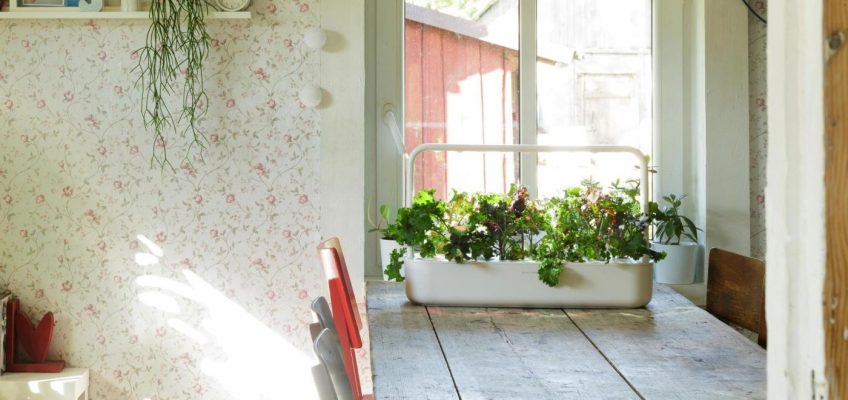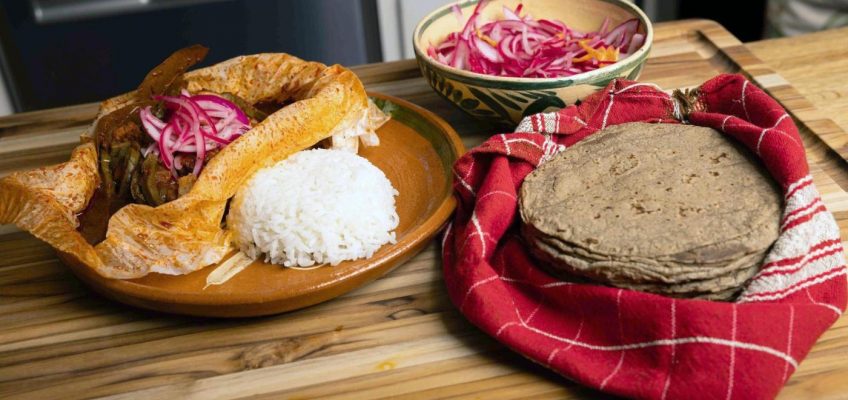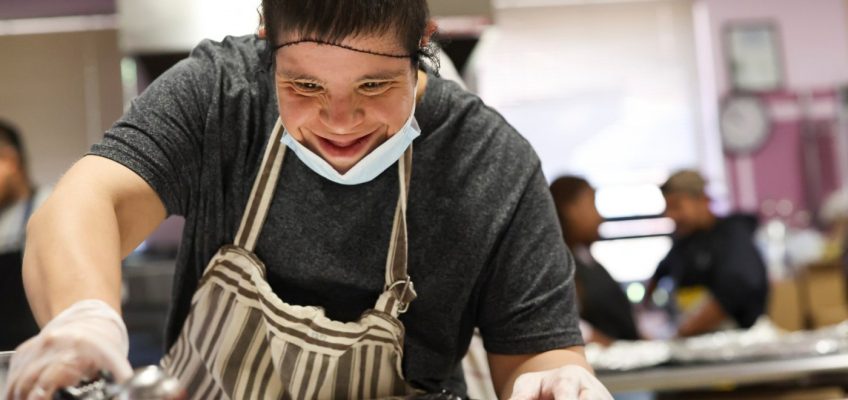On a recent Sunday, I stood in the kitchen with my brother Daniel, watching as he cracked the fifth and final egg into a bowl — the blue bowl, his favorite for making scrambled eggs. He reached for the fork to whisk them, humming, clicking his tongue and smiling widely. At 49 years old, Daniel has enjoyed eggs for a while — ever since our time on a Wisconsin farm as kids, when we made frequent visits to our next-door neighbors, “Grandma” Jeanette and “Grandpa” Chester, dairy farmers who sent us home with a fresh dozen every week.
Our parents learned of my brother’s autism when he was 3 years old, and as he grew, our family watched Daniel become who he is: someone who adores the beach and the Beatles, thrives on being on-the-go, and, like the rest of his family, loves food.
Daniel poured the eggs into the skillet and reached for the spatula I handed him, scrambling the yellow of the yolks; singing the refrain from “Home” by Edward Sharpe and the Magnetic Zeros. After weeks of practice, I now let Daniel lead the charge on this recipe, but I stay close, concerned for his safety around the heat. It’s why we cook with an electric skillet as opposed to an open flame, the pan’s temperature dial and larger dimensions proving easier for Daniel to manage.
I am not alone in considering modifications in the kitchen — and beyond — for a loved one with a disability. In 1988, Congress passed the Assistive Technology Act, a law issuing federal funding to states to help increase access to assistive technology devices and services for individuals with disabilities.
Lynn Hess, a daytime support provider culinary instructor, helps Jesus M. with a glove at Gateway to Learning in Lincoln Square, Sept. 9, 2025. (Eileen T. Meslar/Chicago Tribune)
In 1989, the Illinois Assistive Technology Program began. Its mission is to provide individuals living with disabilities and health conditions greater access to assistive technology devices and services, enhancing their independence and participation in daily life. IATP is based in Springfield and serves people throughout Illinois.
“We realize that not everybody with a disability can make the drive to us, and so we come to them,” says Jessica Schuyler-Weir, director of training. “We want to welcome anybody who wants to learn about how assistive technology can help them.”
The team works with individuals, their families and their caregivers to determine the best way, be it a site or home visit, for the individual to engage with IATP’s core programs. These include a Device Loan Library, a Demonstration Center (featuring demonstrations of thousands of devices), and a Reuse Program, offering gently used and new assistive technology devices and durable medical equipment to those who would otherwise be unable to afford them. If an individual has a need that a device doesn’t meet, they can speak with IATP’s Makers Program about custom fabrication.
“I am a person who was born with one hand, and now I am learning to play the guitar because of an IATP Makers creation — a prosthetic pick,” says Schuyler-Weir.
In recent years, IATP has launched additional initiatives, including its Tech Kitchen, a program dedicated to equipping individuals with assistive technology tools and training needed to develop culinary skills and confidence in the kitchen.
“People were often asking us about training programs to learn independent living skills in cooking,” says Schuyler-Weir. “We wanted to fill that void.”
Paola P., left, puts sprinkles on cookies as James G. dips the cookies in chocolate at Gateway to Learning in Lincoln Square, Sept. 9, 2025. (Eileen T. Meslar/Chicago Tribune)
The IATP team welcomes individuals to their homestyle teaching kitchen in-person or virtually for demonstrations and to provide a tour of an accessible kitchen layout. The Tech Kitchen offers cooking classes to residents of Illinois aged 14 and up, with any disability, who currently receive services from one of the major bureaus of the Illinois Division of Rehabilitation Services. They also coordinate home visits, sending a chef-instructor and occupational therapists to clients.
“Our team works with the individual to determine their specific needs, available resources and how they can benefit from assistive technology,” says Schuyler-Weir. From there, the team employs a device loan system helping individuals acquire needed devices. Should that device no longer be needed, it can be recycled back to IATP’s Reuse Program.
During visits, Tech Kitchen staff work with individuals to develop a variety of functions in the kitchen, including recipe literacy, meal planning, and knife and stove safety, using tools ranging from air fryers and induction burners to plastic cutlery and smart technology. It all begins, Schuyler-Weir notes, with time spent with the individual, learning their skillsets and enthusiasms.
“We never start with what it is that an individual can’t do, but instead, with what they want to do — what they want to cook, and to eat — and what challenges are between them and these goals,” she says. “We ask ourselves, ‘How can we build up this individual and their experience in the kitchen?’”
Schuyler-Weir references one of their clients, whose mother was eager to see her son embrace his desire to cook, but who was concerned for his safety around stovetops.
“By the end of the day, he made quesadillas independently,” says Schuyler-Weir. “People who never thought they or their loved ones could cook in the kitchen are seeing the benefits of these tools — who knew all that an air fryer could do, or that you could bake bread in a microwave? There are so many options.”
While individuals can receive the fullest range of benefits of IATP’s Tech Kitchen only as a client of Illinois’ Division of Rehabilitation Services, Schuyler-Weir notes that the team works to find sustainable solutions for everyone, including resources on where to buy devices and how to access Tech Kitchen demonstration videos.
“We want to reach as many individuals as we can with this work because we know the impact it has on the lives of those who need it most.”
Jesus M. and Donna M. make balls of cookie dough with an ice cream scoop before putting them on a baking sheet at Gateway to Learning in Lincoln Square, Sept. 9, 2025. (Eileen T. Meslar/Chicago Tribune)
James G. dips cookies in chocolate at Gateway to Learning in Lincoln Square, Sept. 9, 2025. (Eileen T. Meslar/Chicago Tribune)
In addition to working directly with individuals and their caregivers, IATP also responds to Tech Kitchen inquiries from community day programs and residential providers. Culinary education is a cornerstone of the curriculum at Gateway to Learning, a Lincoln Square program dedicated to providing lifelong learning opportunities to adults with intellectual and developmental disabilities. To help inform their programming across four kitchen classrooms and onsite bakery Dorothy’s Sweet Shoppe, Gateway contacted IATP for a virtual training.
“Many staff expressed interest in learning how to adapt culinary tasks to maximize participant independence, and IATP offers that expertise,” says Amanda Bulgrin, director of community day services at Gateway to Learning. IATP’s training covered topics such as mobility and low vision considerations, adaptive measuring tools, and knife safety. The insights served as refreshers and guidance for the Gateway to Learning team, which continues to champion the culinary arts as a means of creative expression and autonomy building for their community.
“When one cooks or bakes, the most noticeable result is the meal or the baked good. But the reality is that someone is gaining a lot of experience and skill development in the process,” says John Ratzenberger, chief operating officer at Gateway to Learning.
Bulgrin agrees. “Life skills are key in a person achieving increased independence,” she says. “In turn, these skills build self-esteem and confidence — it feels good.”
That Sunday at home, I came around the kitchen counter next to where Daniel stood and asked if he wanted my help. He looked at me, then back to his dish, now nearing completion in a steaming, perfectly fluffy scramble.
Daniel kept his gaze on the skillet, using the spatula along its edges, pausing his singing only momentarily to speak.
“I want to do it myself.”
He returned to his song and to his spatula, smiling wider this time.
Nicole Schnitzler is a freelance writer.




